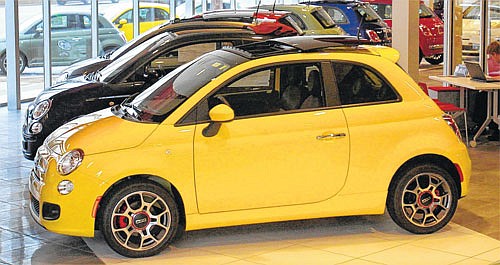The recovery in the American auto industry has moved into the fast lane.
With gas prices at nearly $4, smaller cars like the Ford Focus, Nissan Versa and Fiat 500 flew off dealer lots in March and gave U.S. car makers their best monthly sales in almost five years.
Larger vehicles sold well, too, offering more evidence of growing confi dence in the economic recovery. Small businesses, farmers and others took advantage of big promotions to buy pickups.
In all, Americans bought 1.4 million cars and trucks in March, up 13 percent from the same month a year ago. Edmunds.com said was the most vehicles sold since August 2007.
GM, Chrysler and Toyota all reported double-digit gains over last March. Nissan and Hyundai set company records. Only Honda Motor Co. reported a decline.
If car sales stay at the same rate as March, they would end the year at 14.4 million, up from 12.8 million in 2011. While that's still below the 17 million of the booming mid- 2000s, it's far higher than the industry's downturn in 2009, when 10.6 million vehicles were sold.
Jesse Toprak, vice president of industry analysis at car buying site TrueCar.com, expects continued strong sales this year, thanks to compelling new products, improvements in consumer confidence and the stock market and low interest rates.
"The good news is that the recovery has legs," he said. He expects total sales of 14.5 million in 2012.
That would be a faster pace than many were predicting at the start of the year, and it builds on a strong performance in January and February. As recently as October, J.D. Power and Associates lowered its 2012 forecast from 14.1 million vehicles to 13.8 million because of high gas prices and continuing economic uncertainty.
"Auto is important because it creates so many other jobs," said Sung Won Sohn, an economics professor at California State University. "Think about the things that go into an auto: glass, textiles, rubber. There's a lot of financing activity. We are talking about a very significant portion of job creation."
Sohn said a lot of pent-up demand remains in the U.S., from people who couldn't afford cars during the recession to those who waited for Japanese inventories to improve after last March's earthquake. The average age of a vehicle on U.S. roads has reached 10.8 years, and many need to be replaced. GM's U.S. sales chief, Don Johnson, says pent-up demand will continue to fuel sales well into next year.
Sohn says high gas prices are actually helping persuade people to trade in older, less efficient vehicles.
Alan J. Ward, a Chicago psychologist, felt forced to buy a new car because of the cost to repair his older BMW and fill it with gas.
On Tuesday, Ward was shopping for a Volkswagen Passat that uses regular unleaded, which is generally 10 cents to 15 cents cheaper per gallon than the higher-grade fuel he's been using. And he's thinking about retirement.
"For those who will be moving toward a fixed income, you don't want to get stuck," Ward said. "The price of gas keeps going up and your income is static."
High car prices don't seem to be holding buyers back. TrueCar said the average vehicle price reached a new record of $30,748 in March, around $2,000 more than the same month last year. Even though drivers are switching to smaller cars, they're appointing them with expensive luxuries such as leather seats and navigation systems, Toprak said.
